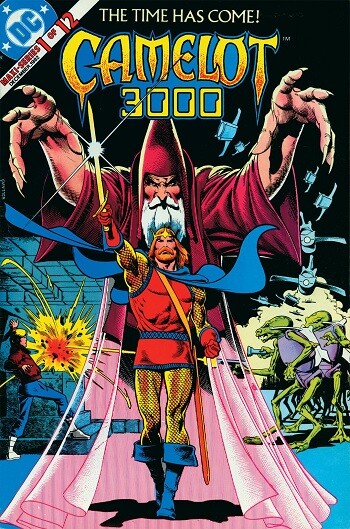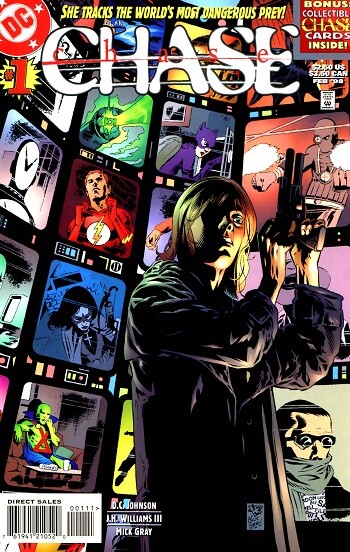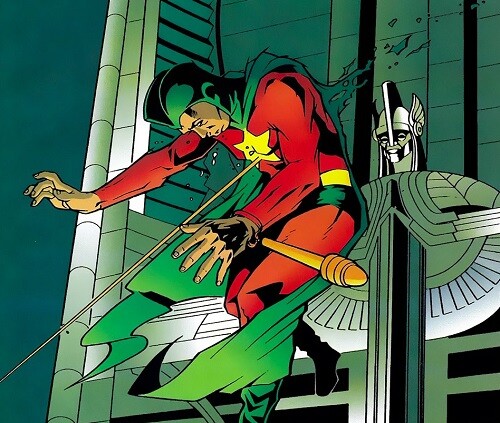4 Forgotten DC Characters That Would Make Killer TV Shows

The problem with adapting famous comic books is that all of their best ideas have probably been pillaged by Hollywood already. A movie about Marvel's The Ultimates would be kinda redundant since it served as the basis for the whole MCU, and any show based on DC's The Invisibles would inevitably end up being called a The Matrix ripoff (it's the other way around). No, we believe that the key to producing a mind-blowinginly good comic book adaptation is to grab a series or character relatively few people outside of fandom give a crap about and adapt that -- we call this "the Peacemaker Paradox." With that in mind, here are four other DC series we believe should be turned into TV shows before Marvel takes the basic premises and uses them on, say, a Groot show:
Captain Atom (1987-1991)
Captain Atom is best known among casual comics fans for being the inspiration behind Watchmen's omnipotent exhibitionist, Dr. Manhattan, and we have previously pointed out how silly his original 1960s adventures were. However, the character also starred in an '80s series with a pretty cool high concept premise: he's an Air Force captain who was framed for war crimes and, in order to avoid the death penalty, agrees to take part in a military experiment that seemingly turns him into, well, atoms. About 20 years later, the atomized captain suddenly reappears at the site of the experiment, now with quantum energy-based powers and a shiny new look.

DC Comics
Problem is, he's still technically a felon, so he's forced to act as a government-controlled superhero to commute his sentence while also investigating his frame job AND dealing with the fact that his military rival married his wife and raised his now-adult children. Those wacky '60s stories are used as a fake backstory created by the government to gain him the trust of the other superheroes -- he even gets into the Justice League and feels crappy about spying on them, which of course causes some drama when he's found out.

DC Comics
All of this could easily end up as the basis for some dumb CW series, but it'd be much more interesting to use it to talk about how superheroes are used as military propaganda and how that conflicts with their supposed values. Just leave out the part of his series where DC wanted to turn him into a futuristic tyrant, got cold feet, and ended up ruining a whole other comic.
In the early '80s, Camelot 3000 made history by being one of DC's first adult-oriented comics, one of their first limited series, and one of the first where the issues came out massively late (it was supposed to last a year but lasted three). It was worth the wait, though. The story is about King Arthur waking up in the middle of an alien invasion in the 31st century to fulfill a prophecy that he would return when England needed him the most.

DC Comics
After hooking up with the immortal Merlin again, Arthur sets about getting his old gang back together by finding the reincarnated versions of his Knights of the Round table. Lancelot is a French billionaire, Galahad is a suicidal futuristic samurai from Japan, Gawain is a South African father who ditches his family to go save the world, etc. It's interesting that the race-bending of the cast is actually part of the plot and that readers at the time didn't seem to mind it (today it would inspire hours of angry rants about DC being PC). Some did object to one part: Sir Tristan reincarnates in a female body but still identifies as a man, and instead of being used for comedy as most '80s comics would have done, we see the way he struggles with his sexual identity. The treatment of trans issues isn't perfect, mainly because the writer didn't know he was treating trans issues, but it's still pretty groundbreaking for its era.

DC Comics
Another source of drama is the fact that Arthur's trusted friend Lancelot and wife Guinevere can't help “reincarnating” their horniness for each other, but the fact that there's a sordid love affair involved just confirms that this is meant to be a prestige cable drama.
Chase (1998)
Cameron Chase appeared in CW's Supergirl series as an FBI agent, but the show really didn't do the character justice. In the comics, she works for an agency tasked with keeping tabs on superpowered people and ironically hates superheroes. Double ironically, she has powers herself but hides them from her bosses, which is a good recipe for some good seasons-long tension. Her assignments range from stuff like "babysit the Teen Titans during a promotional appearance" to "make sure the Suicide Squad doesn't come back alive from a mission."

DC Comics
There's even a "bottle episode" where she's trapped in an elevator with her sister and we learn more about their murdered superhero dad -- a.k.a., the source of her super-fobia. Another issue is about her and her friends just going to see a Green Lantern biopic starring Mel Gibson, which we can totally see (especially since it's the Green Lantern who went insane). Sadly, Chase only lasted 10 issues and future appearances never quite recaptured the sardonic tone of her original series, making this perfect source material for an awesome show that gets cancelled too early and breaks your heart. Get on that, HBO or whoever.
Starman (1994-2001)
Starman was one of the most acclaimed DC series of the ‘90s, but then they made a huge mistake: they let it end with dignity at 80 issues. Sure, that was absolutely the right thing to do from an artistic and storytelling perspective, but the fact that the main character hasn't appeared in a comic in over 20 years (except for a few of silent background cameos in weddings and funerals) means that the series dropped off the cultural radar and DC has rarely kept the collected editions in print, reportedly due to low pre-orders. This series is so neglected that even an official description from DC's actual website talks about the wrong character.
On the other hand, that means not that many people have had the plot of a potential adaptation spoiled. Speaking of which, here's a small spoiler: the comic starts with the title character getting killed (literally on the third page).

DC Comics
The series is about Starman, a classic 1940s DC hero, retiring and leaving his cosmic staff and costume to his son David, who was born for the job. Unfortunately David doesn't last very long at it (see image above) and the role of Starman ends up falling on his brother Jack, who was not born for the job and wants nothing to do with it. The series has all the elements of a prestige drama: a flawed protagonist with some sort of untreated personality disorder (Jack is compulsive collector of vintage junk who probably has OCD or something), a cast of morally "complicated" characters (all the supervillains Jack befriends), a more grounded take on its genre (for once we see the weight and consequences of superhero violence, kinda like The Sopranos did with gangster movies), and obscure/kinda pretentious references (every other Jack dialogue).
There was a Starman TV adaptation in the works in the early 2000s, but it was abandoned after DC's Birds of Prey show flopped and there have been no more attempts since then. Instead, DC has made three seasons of Stargirl, a show based on a Starman follow-up comic that only lasted 15 issues. The upside is that the show has resulted in a renewed interest in star-related DC properties in general, which led to Starman finally being reprinted again. Give us an actual Starman show, DC! Or at least keep the dang books in print this time.
Follow Maxwell Yezpitelok's heroic effort to read and comment on every '90s Superman comic at Superman86to99.tumblr.com.
Top image: DC Comics